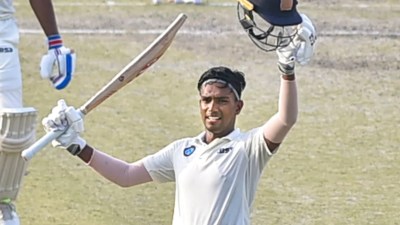Web journalism means relationships,loyalty,engagement: Jeff Jarvis
He feels dialogue between editor and reader should be that of collaboration and increased engagement.
American journalist,professor,public speaker and an avid advocate of the Open Web,Jeff Jarvis,believes that journalism on Internet is slowly becoming a yardstick to measure relationships,loyalty,engagement and value.
“And good relationships mean good business, Jarvis told senior editors of The Indian Express and students of the Express Institute of Media Studies at a recent interaction in Delhi.
Jarvis touched upon various topic from the business of journalism,to the importance of technology,to even whether Google can turn on us. “But why should it, said the professor.
Jarvis describes himself as an entrepreneural journalist. “When I was a young journalist,I was asked to keep away from business. We became irresponsible stewards of the business. I wanted to teach my students how the business of journalism worked, Jarvis said.
Jarvis added: “Eighteen years after the advent of the commercial web,newspapers in US are still struggling to figure out what to do with it. India has the huge opportunity to leapfrog the web world… you can re-imagine and rethink news based on,say,devices like phones.
Jarvis said,”Measuring website popularity by unique views is shallow. It is important to measure relationships,loyalty,engagement and value.”
Jarvis said that journalism on the Net should no longer be the one-way traffic that it is at present. Editors upload their stories and their work is done. They expect the Netizen to react to it. Dirty comments often pour in as a result.
“But is that the kind of Internet we want? Jarvis asks. He feels the dialogue between the editor and the reader should be that of collaboration and increased engagement.
Can Google turn on us?
The business of journalism
When we first joined journalism,we were told to stay away from business. It was evil and corrupted. That meant we didn’t know anything of the business. The U.S. Today is a mess because journalists didn’t know the business. I teach students how the business of journalism works. The influence of the Internet will be universal even though the situation in India is different from the U.S. where newspapers are floundering.
An entrepreneur in Russia told me last week that in India the digital market is more about service than content. This is a gigantic opportunity. You can go straight to mobile,rethink content for the mobile. I like to be a little controversial. I am not sure we are necessarily in the content business. We have to rethink journalism as a service than a manufacturing factory to fill space. The difference between mobile and the web is that the mobile knows where you are,who you are, where u r going,what you want etc… I never told Google where I lived,Google figured it out… It tells me how long it will take me to reach home… it gives me the weather. Google intuited all this. With this service,we can serve people as individuals rather than as a mass.
Indian Express on Net
How does a newspaper fit into this scenario?
The newspaper manufacturing process serves the same thing to everybody. We have to prioritise. We know who our readers are,what their priorities are.
The newspaper gives a story. The web adds to it,deconstructs it as well as embellishes it with background for the novice. Individuals can go to that part of the story that suits him. But in a mobile,the software cuts the story into pieces. If you have read it once,and decide to come back,it will give you what is new in the story. Plus,it has a quote as a database. So any story that has the same quote starts to fall on that. You begin to think differently.
What kind of Internet do we want?
The first limitation of comments is out editorial ego. We finished our story,now we shall ‘allow’ you (the reader) to comment in it. So the comments go nuts. It is not a great format. The higher form of interactivity is collaboration. How do we get people to work with us,to create something better than we could have done alone? One might say it is crowd-sourcing,the reader might be busy. But if we do it after thinking through the mutual benefit,then one can find a lot of ways to collaborate. We don’t know everything. What we can do is create platforms that will enable people to share what they know. When that happens,it brings out things that we didn’t know. Then we as journalists can add value to that. The highest value we can possibly add is to report,to answer the questions,confirm facts,give perspective,we can coordinate people to help.
Technology is important!
The newspaper vs Internet?
A lot of desperate efforts are on to save the newspaper,to preserve their own . I work for a company called Digital First Media in America. It has the second largest group of newspapers in America.
The owner tells his staff to put things on the Internet first,the newspaper is the by-product. He tells his readers to go to the Web. And,he will also give them the newspaper. He tells his advertisers to advertise on the Net. He pays executives more for getting the Web ad. He has got together the paper of the future. Everybody has to get in the U.S. A fully sustainable digital version of a newspaper. The goal is not to save the newspaper but to save the news copy.
Do people only consume news they want to consume?
I am not going to concede the point. Are we getting what’s important,what we need,are you getting what you wouldn’t receive? I feel well-served by Twitter. I discover more things today than I did yesterday.
Writers are paid according to traffic they generate. In this scenario how conscious must be of Internet,technology?
There is danger there. Right now,we measure website popularity by unique visitors and page views. This is a very shallow measurement. It is harming newspaper sites. More is not necessary more value. I like to measure relationships,engagement. More can be corrupted.
I want to start measuring relationships. How many people do we know? How many can we serve? How many can we add value to?
For more views of the American professor,visit:
For more The Indian Express Exclusive Videos visit http://www.youtube.com/IndianExpressOnline
- 01
- 02
- 03
- 04
- 05































